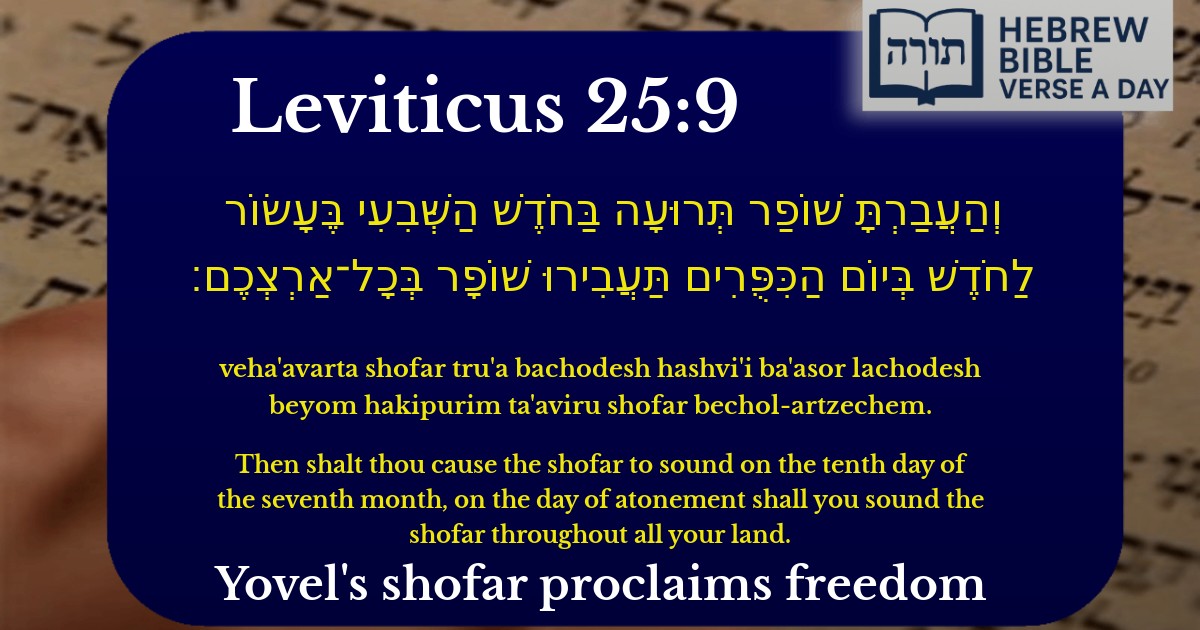Join Our Newsletter To Be Informed When New Videos Are Posted
Join the thousands of fellow Studends who rely on our videos to learn how to read the bible in Hebrew for free!
Hebrew Text
וְהַעֲבַרְתָּ שׁוֹפַר תְּרוּעָה בַּחֹדֶשׁ הַשְּׁבִעִי בֶּעָשׂוֹר לַחֹדֶשׁ בְּיוֹם הַכִּפֻּרִים תַּעֲבִירוּ שׁוֹפָר בְּכָל־אַרְצְכֶם׃
English Translation
Then shalt thou cause the shofar to sound on the tenth day of the seventh month, on the day of atonement shall you sound the shofar throughout all your land.
Transliteration
Veha'avarta shofar tru'a bachodesh hashvi'i ba'asor lachodesh beyom hakipurim ta'aviru shofar bechol-artzechem.
Hebrew Leining Text
וְהַֽעֲבַרְתָּ֞ שׁוֹפַ֤ר תְּרוּעָה֙ בַּחֹ֣דֶשׁ הַשְּׁבִעִ֔י בֶּעָשׂ֖וֹר לַחֹ֑דֶשׁ בְּיוֹם֙ הַכִּפֻּרִ֔ים תַּעֲבִ֥ירוּ שׁוֹפָ֖ר בְּכׇל־אַרְצְכֶֽם׃
וְהַֽעֲבַרְתָּ֞ שׁוֹפַ֤ר תְּרוּעָה֙ בַּחֹ֣דֶשׁ הַשְּׁבִעִ֔י בֶּעָשׂ֖וֹר לַחֹ֑דֶשׁ בְּיוֹם֙ הַכִּפֻּרִ֔ים תַּעֲבִ֥ירוּ שׁוֹפָ֖ר בְּכׇל־אַרְצְכֶֽם׃
🎵 Listen to leining
Parasha Commentary
📚 Talmud Citations
This verse is not quoted in the Talmud.


The Commandment of Shofar on Yom Kippur
The verse (Vayikra 25:9) commands the sounding of the shofar on the tenth day of the seventh month (Tishrei), which is Yom Kippur. This mitzvah is part of the laws concerning the Yovel (Jubilee) year, as Rashi explains: "On Yom Kippur of the Yovel year, the shofar is sounded to proclaim freedom for slaves and the return of ancestral lands." The shofar blast serves as a divine declaration of liberty, echoing the sanctity of the day.
Symbolism of the Shofar
Rambam (Hilchot Shofar 1:1) teaches that the shofar carries profound spiritual significance, particularly on Yom Kippur. Its sound:
Halachic Context
The Talmud (Rosh Hashanah 33b) discusses whether this mitzvah applies annually or only during Yovel. While the shofar is primarily blown on Rosh Hashanah, this verse specifies its unique role on Yom Kippur of Yovel. The Ramban emphasizes that the Yovel shofar is distinct—its sound must be heard "throughout all your land," symbolizing universal proclamation.
Midrashic Insights
The Sifra (Behar 3:9) links this verse to Har Sinai, where the shofar announced the giving of the Torah. Just as Sinai marked a covenantal moment, Yovel’s shofar renews the covenant of justice and equity. The Midrash Tanchuma (Behar 4) further teaches that the shofar’s sound on Yom Kippur parallels the kol demamah dakah (still, small voice) heard by Eliyahu—a call to inner transformation.